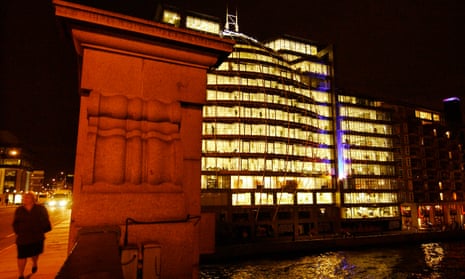It’s time – nay, high time – to get a little more interested in Ofcom as a tide of new challenges sweeps in. Worried about Rupert and his merger mania? Call for Ofcom. Worried about Britain’s sluggardly broadband? Call for Ofcom. Worried over who should regulate the BBC as its trust goes bust? Call for Ofcom.
Yet this, remember, is a bouncing Blair baby (born 2003) that all good Tories are supposed to want cut down to size. Here’s an exultant PM Cameron in 2010: “With a Conservative government, Ofcom as we know it will cease to exist … Its remit will be restricted to its narrow technical and enforcement roles.” Huffle-puffle. All British broadcasting – who shall own it, who shall run it, who shall explore its future – is now effectively superintended from one big office in Southwark Bridge Road. Politicians come and go: but Ofcom goes marching on.
How has this unlikely triumph for onrushing regulation been contrived? By shrewd, punctilious operation (you might fairly say). By an appointments policy that draws the media and communications industries’ great and good into a broad church. But also by a sense of inevitability. For every time something goes wrong in a headline-catching area, Whitehall looks around for a problem-solver or long-grass specialist. Ah! Here’s Ofcom.
Lord Justice Leveson wanted to make it the flashing blade of probity for Fleet Street, until even the politicians protested. The moment the BBC slid into another thrashing crisis, the stripping-away of its self-regulatory powers became inevitable. Another empire-builder. And who, out in the media world, would want to argue with that – or anything else that Ofcom decrees? Heads down; lips buttoned; prudence and self-preservation rule OK.
But now, perhaps, you can feel such restraints beginning to fray a little. It will be difficult for Ofcom, if ministerially summoned to action, to block Murdoch’s bid to buy the whole of Sky this time. And as for the BBC, expect hot potatoes by the lorryload.
So it’s instructive to play Dacre of the Mail or Gallagher of the Sun, and imagine what they might say when a BBC dust-up lands at Ofcom’s door.
Hear a screech of brakes turn into screams. For what is this monster, as the scales drop from tabloid eyes? Its supreme chair, the monarch of the top board, is a former director of BBC policy planning. The subsidiary content board that will handle the vast bulk of BBC regulation is currently chaired by Nick Pollard, a former BBC (and almost everything else) hand recalled to the colours to report on the corporation’s Jimmy Savile coverage.
Those who sit alongside him include a former BBC news and current affairs (Wales); a former BBC head of news and current affairs (Northern Ireland); a former BBC controller of public policy; a couple of experienced BBC freelance broadcasters – and now, recruited to run the content group, a former deputy boss of the BBC newsroom and controller of News 24.

This wasn’t supposed to happen, of course. Sir David Clementi, the City big name called into advise government on dismembering BBC regulation, wanted Ofcom to create a separate mirror-image of its content board so that tackling corporation regulation could be a more concentrated, transparent task. But Ofcom quietly brushed Clementi aside a few months ago. The BBC is to be just another weighty job grafted onto existing structures (with 50 new signings to staff it recruited already).
You can feel the Mail’s ancestral rage rising already. Think quango bloat. Think supposed supreme court prejudice squared. And if, perchance, the next row is yet another Brexit bomb, then note that Sharon White, Ofcom’s chief executive, is the wife of Robert Chote, the head of the Office for Budget Responsibility whose forecasts of post-EU financial hardship so outraged mighty media Leavers. What’s more, Sharon was a top Treasury mandarin whisked over to Ofcom on George Osborne’s watch – and just look who sits there at her boardroom side: Graham Mather, chairman of the European Policy Forum. Cue nest-of-elite-vipers diatribe.
Look at Leveson, with his almost obsessive anxiety to keep newspaper editors or political players away from press regulation. Then ask yourself whether Ofcom’s nominating committee (choosing candidates, giving ministers only approval rights for topmost posts) is Leveson-compliant. Would two out of the last three Ofcom chiefs have been allowed to come straight out of Blair’s Downing Street? Is it right that they’re both now employed in private companies as lofty guides to regulatory navigation?
“Ed Richards was chief executive of Ofcom, the UK media and telecoms regulator, for eight years. In that role, he worked closely with the European commission and was also vice-chair of the Body of European Regulators for Electronic Communications,” says Flint Global, where Ed is managing partner. “Ed leads on advice to clients on regulatory challenges, competition and policy development.”
Much of such criticism, perhaps, may be deemed pretty steaming detritus. But that wouldn’t stop mighty Dacre-lashed waves of it coming down the Thames at storm time. And nor does it make Ofcom, in history and present operation, totally fit for any possible practice. Our media world is a tight little entity where job-waltzes between the BBC/C4 public sector and private areas of ITV and indie production companies are the absolute norm.
In this world, everyone knows everyone, and everyone has a back story. Will that make regulating Broadcasting House and its output easy? No. It creates a new swirl of motives, doubts and potential sorrows. Too close, but also too distant, for comfort.
Good luck to Ofcom on the great journey of 2017, then. Good luck to all called to play BBC guardian in times of stress. But as for peace, calm and harmony on Southwark Bridge … Look down into the murky waters. You ain’t seen nothing yet.

